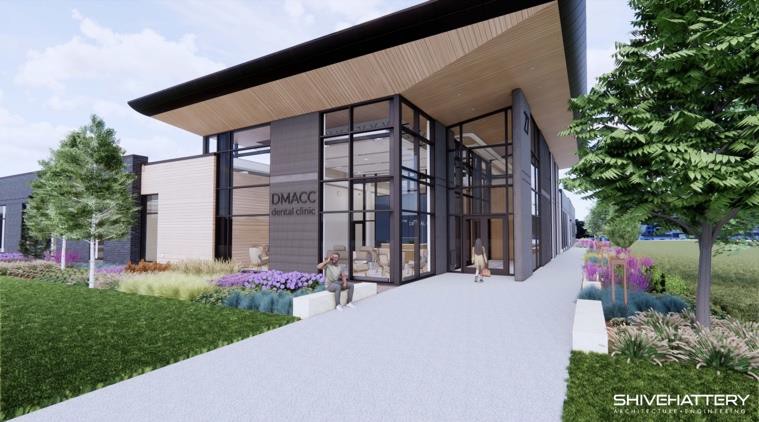A seat at the table
UnityPoint Health and MercyOne play key roles in initiative to help hospitals address pharmacy drug shortages

Behind the scenes at Iowa hospitals, pharmacy staffs routinely spend considerable parts of their workdays ensuring they can obtain adequate amounts of critical drugs, dozens of which are in chronically short supply across the country.
Over-concentrated production by drugmakers, massive price spikes and unforeseen disruptions like natural disasters are among the factors that frequently disrupt a fragile supply chain for commonly used injectable or intravenous drugs that hospitals use.
To address the chronic short supply of hospital drugs and the ensuing high prices, hospital systems across the country have invested in an initiative to create a nonprofit generic drug company called Civica Rx. By guaranteeing a stable demand for its products, the 18 participating health systems — which include the parent companies of both MercyOne and UnityPoint Health — anticipate fewer shortages and lower costs. In total, about 800 hospitals are part of the initiative.
“It’s just really an investment in our future for providing great benefits to our communities in terms of having access to these drugs that go on shortage,” said Craig Frost, system vice president of Clinical Pharmacy Services for Catholic Health Initiatives, based in Englewood, Colo.
As part of the “governing tier” of health systems, MercyOne’s partner health systems — Catholic Health Initiatives and Trinity Health of Livonia, Mich. each invested $1 million as part of $30 million in initial funding from seven major health systems, collectively representing more than 120 health organizations and about one-third of U.S. hospitals.
Subsequently, Iowa-based UnityPoint Health joined 11 additional health care organizations that invested earlier this year with a “founding tier” of health systems, which collectively represent about 250 hospitals around the country. UnityPoint Health officials declined to say what the health system invested in Civica.
In mid-May, Civica Rx announced that its first supplier partner, Denmark-based Xellia Pharmaceuticals, will manufacture essential antibiotics for Civica. The first two will include Vancomycin and Daptomycin, two commonly used anti-infective medications that are in short supply. Those two pharmaceuticals are the first of some 14 drugs that Civica hopes to be able to begin supplying by the end of this year.
“Civica’s primary mission is to provide access to all these generic injectable drugs at a sustainable price,” said Frost, who also serves on Civica’s drug selection committee. “That doesn’t mean it’s always the cheapest price, but it’s a sustainable price.”
Daily shortages
Hospitals across Iowa struggle daily with shortages of key drugs, which force hospital pharmacists like Stephanie Lingen, manager of Pharmacy Services for MercyOne-Des Moines, to constantly find creative workarounds.
The shortages can create financial hurdles. In some cases, the hospital is able to find a particular drug but may have to pay considerably more for it, she said.
One of the biggest clinical impacts, which began about two years ago, has been the shortage of injectable opioids, which are vital drugs for patients both prior to and post-surgery, Lingen said.
“It’s a really hard conversation to have to bring all the physicians together and other pain clinicians with our clinical pharmacy specialist to say, ‘What are we going to do now that we can’t obtain these medications?’ ”
While shortages of drugs have always been an issue to some degree for hospitals, the problem has grown progressively worse over the years, said Greg Young, MercyOne’s market director of pharmacy.
“I’ve been a pharmacy director here 20 years, and I would say 15 years ago, shortages were rare,” he said. “They’ve escalated and increased … particularly with these generic injectable drugs that are so vital. Even though they’re older drugs, they’re critical care agents, they’re agents like antibiotics that we really need.”
He’s anticipating some much-needed relief through involvement with Civica. “We’re preparing for this to be positive, because it will make product available that we’ve struggled to obtain in this shortage situation,” Young said.
Kent Lehr, vice president of strategy and business development with UnityPoint Health, made similar points in a separate interview.
“On any given day, our hospitals can experience shortages in hundreds of drugs,” Lehr said. “That can impact quality. Second, those shortages can cause massive price spikes that can drive up the cost of care overnight.”
The more that he discussed the proposed Civica partnership with UnityPoint Health’s chief pharmacy officer, Gary Robb, the clearer the potential benefits became, Lehr said.
Robb, who like CHI’s Frost is a member of Civica’s drug selection committee, said he believes that Civica’s nonprofit status will be a key to its success.
“Building capacity for a safety-stock supply is important,” he said.
Additionally, the model is built on price transparency, so that all member hospitals pay the same price for a particular drug without any rebates or dividends involved. “I think that whole model promotes transparency and taking care of patients,” he said. It will also enable the smallest rural hospitals and those that are not part of large systems to join Civica and obtain the same benefits.
What progress has he seen in working with Civica’s drug selection committee?
“I think it’s still early, but it’s progressing,” Robb said. “We’ve identified a number of meds that could be developed, based on historical shortages. It’s interesting that these are all generic drugs. And often several manufacturers have stopped making the drug, and only one remains — controlling the supply and demand and therefore the price.”
Reaching consensus among the committee members on the initial drugs to produce wasn’t difficult, he said.
“I think everybody agrees on the drugs we should target; we’re all health system representatives and we’re dealing with these shortages on a daily basis,” Robb said. “So it’s not only price that we’re dealing with, but also the labor involved in having to switch drugs.”
Civica plans a three-prong manufacturing approach. Initially, it will partner with existing manufacturers that hold abbreviated new drug applications, or ANDAs, that have the manufacturing capability and capacity to produce the product.
Second, the organization plans to acquire or develop its own ANDAs and use contract manufacturers to produce drugs under the Civica name.
Ultimately, Civica plans to purchase or build its own manufacturing facilities. The organization in April opened a headquarters in Lehi, Utah, near Salt Lake City.
In mid-May, Iowa Attorney General Tom Miller joined 42 other state attorneys general in suing Teva Pharmaceuticals and 19 of the nation’s largest generic drug manufacturers, alleging a broad conspiracy to artificially inflate and manipulate prices, reduce competition and unreasonably restrain trade for more than 100 generic drugs.
Predatory pricing by pharmaceutical suppliers has been one of the causes of high prices, but not the sole reason, Lehr said. “Suppliers recognize the power they have as limited suppliers and sometimes take advantage of that,” he said.
“You also have situations where you have fragile supply chain issues where you’re relying on a limited number of suppliers for certain drugs,” he said. “A natural disaster or other factors can seriously cause problems, so it’s not just bad actors.”
Civica is one of several approaches that UnityPoint Health is taking to address the issue, he said. “It’s just part of a larger strategy that health organizations are adopting to take the supply issue into their own hands.”
The partnership also provides UnityPoint Health with a seat at the table with like-minded organizations. In addition to having its chief pharmacy officer on Civica’s drug selection committee, UnityPoint Health also has Dr. Kyle Christianson, one of its family medicine doctors in Cedar Falls, on the medical trends committee of Civica. “So he’s helping shape what’s happening clinically,” Lehr said.
More predictable margins
Benefits broker Holmes Murphy last year entered into a partnership with Pharmaceutical Strategies Group, a data analytics and industry intelligence company in Plano, Texas, focused on lowering drug prices.
PSG’s chief executive, Dave Borden, said that Civica could provide a vital piece of financial stability for health care organizations. Because hospitals are paid fixed reimbursements from insurers, they receive the same amount of money irrespective of the amount of money spent during that patient’s stay, he said.
“If you can’t make a margin, you can’t stay in business,” he said. “It’s important for hospitals to be able to predict what their margins will be.”
Charisse McCumber, senior vice president of employee benefits with Holmes Murphy, noted that Iowa is on the lower end of Medicare reimbursement rates nationally, “so that gets made up for by what’s charged for commercial insurance,” she said.
“In Iowa, largely due to the dominance of Wellmark, the reimbursement is about 180% of Medicare, which is more in line with what the hospitals need to stay in business. We do think there should be price indexing fixed to Medicare at a reasonable percentage, but not at 300 or 400% — that’s higher than necessary.”
Borden, who has provided consulting services to some of the largest plan sponsors in the country, said the idea of getting more directly involved in sourcing drugs from manufacturers and guaranteeing supply is relatively new, although somewhat similar to how group purchasing organizations operate.
One such large GPO that sells to hospitals, Premier, has also launched a subsidiary for the generic drug industry called ProvideGX, he said.
“Their approach is that they’re willing to invest in manufacturers to help them step up, so they’re providing capital in debt or equity to produce these drugs, versus Civica’s guaranteed customer approach,” Borden said.
There are differences in the approach taken by Premier as a publicly traded company compared with Civica as a nonprofit, he noted.
“Civica does have the benefit of being more mission-oriented versus margin-oriented,” Borden said. “They also have high-quality health systems with good reputations working together.”
Looking at the way Civica has organized so far, “I think they’re being smart about what they’re doing,” he said. “I think they have a very high likelihood of success. And if you provide stability for hospitals, then in theory you create stability for the patients. We think it’s beneficial for all the stakeholders.”
Both MercyOne and UnityPoint officials are cautiously optimistic about the estimated supply of drugs coming from Civica initially, particularly its pledge to roll out 14 generic drugs this year.
“I think it will be a big impact, actually,” UnityPoint Health’s Robb said. “It will be incremental over time. I think the disruption in the industry will also have an impact — who ever heard of a nonprofit drug manufacturer? It’s almost an oxymoron.”








